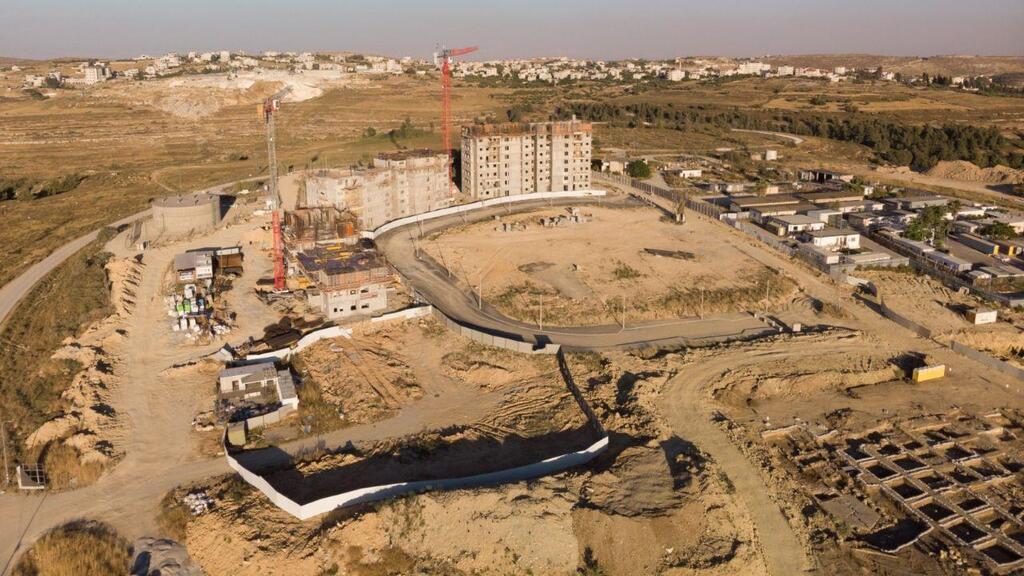US Assistant Secretary of State for Middle East Affairs Barbara Leaf is visiting Israel Sunday and will hold meetings in Jerusalem and Ramallah. In Israel, she is meeting with senior officials in the Ministry of Foreign Affairs, the Defense Ministry and the Prime Minister's Office. But against the backdrop of her arrival, the agenda for the Higher Planning Committee of the Civil Administration meeting was published, according to which Israel will promote construction plans for 4,560 new housing units in the settlements.
More Stories:
The Americans put pressure on Israel not to approve the promotion of the units, and the U.S. expressed concern that the Palestinians would not come to the next meeting of the Arava Summit and or security meetings in Sharm el-Sheikh. Israel said that last February it had decided to promote 10,000 West Bank housing units in two phases, and this is the second phase agreed to by the government vis-a-vis the settlers, a practice that also existed during the Trump administration, according to which every four months the Higher Planning Committee meets and approves the promotion of additional housing units.
The last time the government approved housing units in the settlements was in January, when the political-security cabinet decided to legalize illegal outposts, and later the government decided to promote 9,409 housing units in West Bank settlements, including outside the settlement blocs.
The United States later on Sunday responded to the agenda item, and sent a message to Israel that the Negev Forum, which was expected to take place at the beginning of July in Morocco, will be postponed due to the announcement of plans to build about 4,500 housing units in West Bank settlements. The forum was set to be a summit meeting in Morocco of the foreign ministers of the United States, Israel, Egypt, the United Arab Emirates, Bahrain and Morocco. There have already been several postponements of the forum gathering, but it was expected to be held next month. Now the Americans have informed Israel that the agenda item for next week's meeting of the Higher Planning Committee will result in another postponement of the forum meeting.
The construction approvals come after the cancellation of the clauses of the Disengagement Law that ban Israelis from living in four northern West Bank settlements and the transfer of the Homesh yeshiva to state land, steps that drew criticism from the US, including summoning the Israeli ambassador in Washington for a conversation. Finance Minister Bezalel Smotrich, who also serves as a minister within the Defense Ministry, created the Regulation Administration since the formation of the government, which is headed by Yehuda Eliyahu, his confidant, for the promotion and regulation of construction in the settlements on behalf of the Civil Administration.
Plans were published for the construction of hundreds of units in Neve Tzuf and Eli, hundreds of units in Givat Ze'ev, as well as in Beitar Ilit, 340 units in Ma'ale Adumim, 381 in Revava, 343 in Elkana, 287 in Adora and 196 in Telem.
3 View gallery


'West Bank residents will now cease to be second-class citizens', Finance Minister Bezalel Smotrich says
(Photo: Alex Kolomoisky)
Smotrich said that "the construction momentum in Judea and Samaria and in all parts of our country continues. As we promised, today we are promoting the construction of thousands more new housing units in the West Bank. Residents of the West Bank cease to be second-class citizens and the natural development in the settlements is expressed in construction and expansion. I thank Prime Minister Benjamin Netanyahu and Defense Minister Yoav Gallant for their cooperation. We will continue to develop the settlement and strengthen the Israeli hold on the territory."
Smotrich is also promoting a resolution submitted Sunday for the government's approval, which would shorten the promotion of housing units beyond the Green Line. Until now, in order to approve a housing unit in the West Bank, it required approval at the political level at various stages of the process. Now, a decision will require only a preliminary approval and will be transferred from Defense Minister Yoav Gallant to Smotrich's authority; in some cases it may also require a final approval. This is expected to shorten the time for the promotion of West Bank housing units, though each unit will require a political approval.
In total, the construction approval procedures in the West Bank will be shortened from six stages to only two stages.
This arrangement is part of the coalition agreements and the memorandum of understanding between Smotrich and Gallant. The purpose of the proposal is to eliminate the need for approvals from the political level during the planning procedures themselves, and to transfer the center of control of the political level in the planning procedures. According to the amendment, if the political level is required and decides to approve the advancement of a plan in a certain area, there will be no need for a renewed requirement in later stages.
3 View gallery


Defense Minister Yoav Gallant will transfer some power regarding approval of West Bank construction to Bezalel Smotrich
(Photo: Shiloh Shalom Shalom)
The amendment also stipulates that all permission for planning and publication of tenders for construction will be carried out only after the approval at the political level. Submitting plans in relation to privately owned land will also require approval on the political level. It was also determined that the obligation to obtain political-level approval as a condition for the construction of roads in the West Bank will be abolished.
The shortening of the planning procedures for construction in the settlements is also intended to prevent a situation in which Israel is repeatedly under pressure and condemnation from the American government.
The shortening of the processes for approval of construction in the settlements is dramatic, since in the past there were quite a few cases where plans were dropped in the middle of the long procedure due to security or political considerations – and now they will not be able to be dropped.
The Palestinian Authority Ministry of Foreign Affairs strongly condemned the move and warned "of the dangers arising" from the amendment, which is considered another step toward applying Israeli law to the West Bank, annexing West Bank land and facilitating the construction projects in the settlements quietly and in short stages that may not reach the media.
"The ministry calls for international action and putting pressure on the Israeli government to deter it from taking this decision, which harms the opportunity to implement the two-state solution," the PA Foreign Ministry said in a statement.
The Peace Now movement said in a statement: "The most extreme and dangerous government in the country's history gives fuel to their destruction, and entrusts the political and security interests to those who wish to wipe out a village and represent a small, messianic and dangerous minority. The decision will inevitably lead to more harmful construction and more unnecessary investments in settlements at the expense of the Negev and the Galilee, which are contrary to the Israeli interest and to all logic, as part of an orderly plan to promote a messianic dictatorship between the sea and Jordan. The Israeli government is already promoting de facto annexation, and only a determined and uncompromising struggle will stop it. We call on the public to join us so that Israel does not become an apartheid dictatorship."
First published: 19:52, 06.18.23


